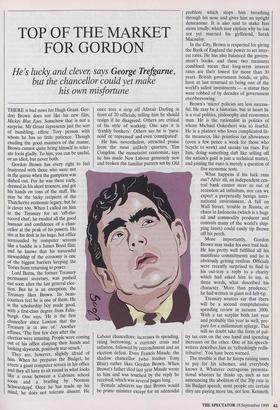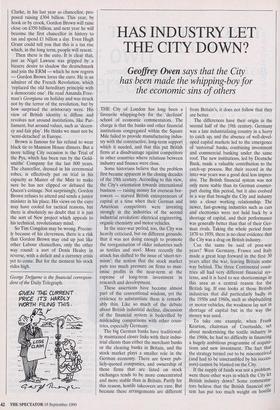TOP OF THE MARKET FOR GORDON
He's lucky and clever, says George Trefgarne,
but the chancellor could yet make his own misfortune
THERE is bad news for Hugh Grant. Gor- don Brown does not like his new film, Mickey Blue Eyes. Somehow that is not a surprise. Mr Grant represents just the sort of bumbling, effete Tory person with whom he has so little patience. Though exuding the good manners of the manse, Brown cannot quite bring himself to toler- ate fools gladly. To him, you can be useful, or an idiot, but never both.
Gordon Brown has every right to feel frustrated with those who were not in the queue when the gumption was dished out. For he was there early, dressed in his short trousers, and got his hands on tons of the stuff. He may be the lucky recipient of the Thatcherite economic legacy, but he is clever too. When I called on him in the Treasury for an 'off-the- record chat', he exuded all the good humour and confidence of a chan- cellor at the peak of his powers. He sits at his desk in his huge, hot office surrounded by computer screens like a baddie in a James Bond film; and he knows that his successful stewardship of the economy is one of the biggest barriers keeping the Tories from returning to power. Lord Burns, the former Treasury Permanent secretary, was pushed out soon after the last general elec- tion. But he is an exception; the Treasury likes Brown. Its bean- counters feel he is one of them. He Is the scholarship boy made good, with a first-class degree from Edin- burgh. One says, 'He is the first chancellor since Lawson that the Treasury is in awe of.' Another effuses, 'The first few days after the election were amazing. People were coming out of his office clasping their hands and looking skywards, positively star-struck.' They are, however, slightly afraid of . When he prepares the Budget, he erects a giant computer screen in his office and they all have to sit round in what looks like a cross between a Calvinist school room and a briefing by Norman Schwarzkopf. Once he has made up his Mind, he does not tolerate dissent. He once tore a strip off Alistair Darling in front of 20 officials, telling him he should resign if he disagreed. Others are critical of his style of working. One says it is `frankly honkers'. Others say he is 'para- noid' or 'repressed' and even 'constipated'.
He has, nevertheless, attracted praise from the most unlikely quarters. Tim Congdon, the monetarist economist, says he has made New Labour genuinely new and broken the familiar pattern set by Old Labour chancellors: increases in spending, rising borrowing, a currency crisis and inflation, followed by retrenchment and an election defeat. Even Francis Maude, the shadow chancellor (who loathes Tony Blair) rather likes Gordon Brown. When Brown's father died last year Maude wrote to him and was touched by the reply he received, which was several pages long. Female admirers say that Brown would be prime minister except for an adenoidal problem which stops him breathing through his nose and gives him an uptight demeanour. It is also said to make him snore loudly, which may explain why he has not yet married his girlfriend, Sarah Macaulay.
In the City, Brown is respected for giving the Bank of England the power to set inter- est rates. He has also balanced the govern- ment's books, and these two measures combined mean that long-term interest rates are their lowest for more than 30 years. British government bonds, or gilts, have at last returned to being one of the world's safest investments — a status they were robbed of by decades of government over-borrowing.
Brown's 'micro' policies are less success- ful. He may be a historian, but at heart he is a real politics, philosophy and economics man. He is the rationalist in politics of whom Michael Oakeshott was so fearful. He is a planner who loves complicated lit- tle measures, like pointless tax allowances (even a few pence a week for those who bicycle to work) and sneaky tax rises. For him, doing something daft like selling off the nation's gold is just a technical matter, and joining the euro is merely a question of five economic tests.
What happens if his luck runs out? After all, an independent cen- tral bank cannot steer us out of recession ad infinitum, nor can we expect a perpetually benign inter- national environment. A fall on Wall Street, trouble in Russia, or chaos in Indonesia (which is a huge oil and commodity producer and controls many of the world's ship- ping lanes) could easily tip Brown off his perch.
More importantly, Gordon Brown may make his own bad luck. He has pretty well fulfilled all his manifesto commitments and he is obviously getting restless. Officials were recently surprised to find in his out-tray a reply to a charity which had asked him to say, in three words, what described his character. 'More than prudence,' he had written in giant red felt-tip.
Treasury sources say that there will be a second comprehensive spending review in autumn 2000. With a tax surplus both last year and probably this year as well, pre- pare for a millennium splurge. This will no doubt take the form of pal- try tax cuts on the one hand and spending increases on the other. One of his speech- writers describes him as 'refreshingly redis- tributive'. You have been warned.
The trouble is that he keeps raising taxes to pay for his schemes, and everybody knows it. Whatever outrageous presenta- tional wheezes he thinks up, such as not announcing the abolition of the 20p rate in his Budget speech, most people are certain they are paying more tax, not less. Kenneth Clarke, in his last year as chancellor, pro- posed raising £304 billion. This year, by hook or by crook, Gordon Brown will raise close on £350 billion, and next year he will become the first chancellor in history to tax and spend £1 billion a day. Even Hugh Grant could tell you that this is a tax rise which, in the long term, people will resent.
Then there is the euro. It is clear that, just as Nigel Lawson was gripped by a bizarre desire to shadow the deutschmark and join the ERM — which he now regrets — Gordon Brown loves the euro. He is an admirer of the French Revolution, which `replaced the old hereditary principle with a democratic one'. He read Amanda Fore- man's Georgiana on holiday and was struck not by the terror of the revolution, but by how surprised the aristocracy were. His view of British identity is diffuse and revolves not around institutions, like Par- liament, but around values, such as 'decen- cy and fair play'. He thinks we must not be `semi-detached' in Europe.
Brown is famous for his refusal to wear black tie to Mansion House dinners. But a more telling City occasion is the Trial of the Pyx, which has been run by the Gold- smiths' Company for the last 800 years. The chancellor, dressed in his ceremonial robes, is effectively put on trial in his capacity as Master of the Mint to make sure he has not clipped or debased the Queen's coinage. Not surprisingly, Gordon Brown refuses to attend and sends a junior minister in his place. His views on the euro may have cooled for tactical reasons, but there is absolutely no doubt that it is just the sort of New project which appeals to his technical, revolutionary mind.
So Tim Congdon may be wrong. Precise- ly because of his cleverness, there is a risk that Gordon Brown may end up just like other Labour chancellors, only the other way round: a sort of Denis Healey in reverse, with a deficit and a currency crisis yet to come. But for the moment his stock rides high.
George Trefgarne is the financial correspon- dent of the Daily Telegraph.



























































































 Previous page
Previous page